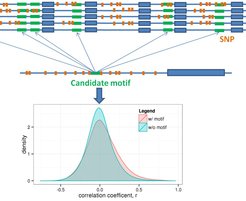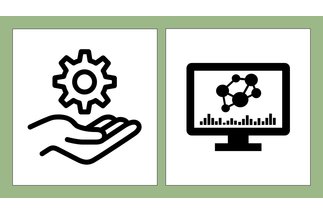Bioinformatics
OMICS Data Analysis
The study of cellular systems using so-called OMICs technologies that aim to monitor an entire complement of a particular level of molecular organization has become standard practice in modern biological research. The application and development of genomics, transcriptomics, proteomics, and metabolomics methods constitutes an integral part of the research activities at the MPI-MP as well. The bioinformatics group contributes to the analysis of the generated large and complex datasets. By integrating diverse datasets across multiple levels of molecular organization, we wish to deduce and understand the principles governing molecular processes in living systems. Here, advanced statistical concepts, network analysis approaches, and machine learning methods, including so-called deep learning methods, are being used and developed.
Focus area Genomics

Figure 1: The integration of sequence and gene expression data led to the identification of novel putative regulatory elements in the genome of the plant Arabidopsis thaliana.
While posing considerable challenges to the bioinformatics data processing, the rapid advancement of novel sequencing technologies (so called Next Generations Sequencing (NGS) methods) also opens new research avenues. Aside from supporting our experimental partner groups in their NGS-data analysis needs, the Bioinformatics group investigates genome structural aspects and gene expression regulatory phenomena (Figure 1) and aims to characterize sequence-structure-function relationships of RNA molecules.
Structural Bioinformatics & Molecular Interactions
At the molecular level, the realization of specific functions relies on specific interactions between molecules that are determined by their spatial structures. Aside from studying protein-protein interactions, the Bioinformatics group investigates binding events of small molecules, in particular, metabolites with proteins (enzymes) and investigates protein post-translational modification events.
Databases and bioinformatics software solutions
The high volumes of OMICs datasets call for an efficient data management and the creation of intuitive visualization tools. The Bioinformatics group has accumulated many years of experience in the development of central databases that provide for reliable data management, and at the same time, allow formulating and answering research questions by querying the data in innovative ways.
Software and database solutions developed at the MPI-MP are available under http://www.mpimp-golm.mpg.de/54630/Bioinformatik-Tools.




